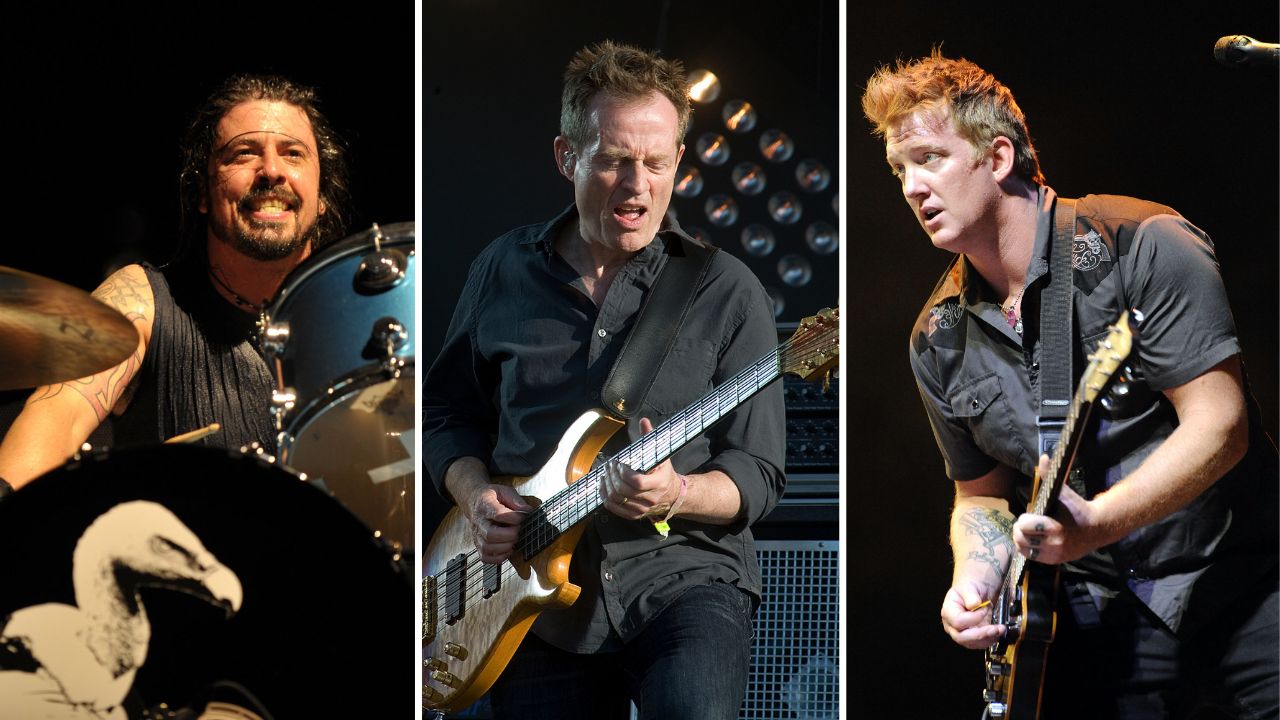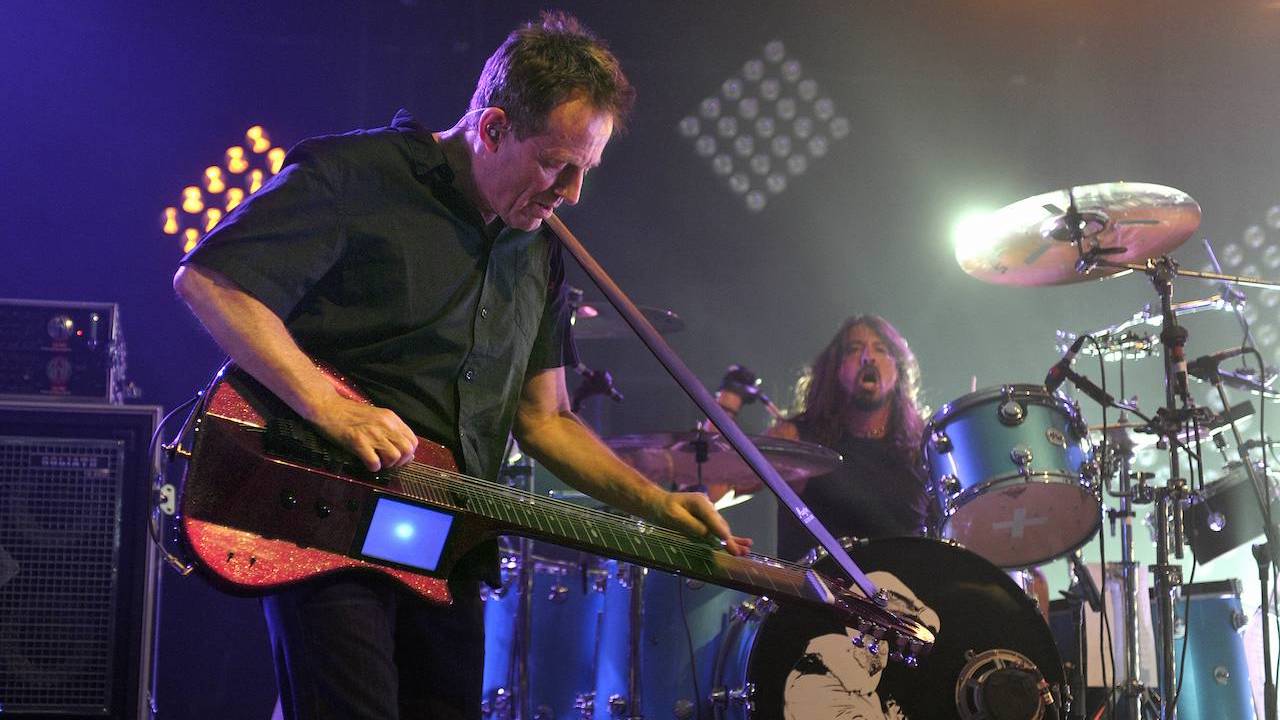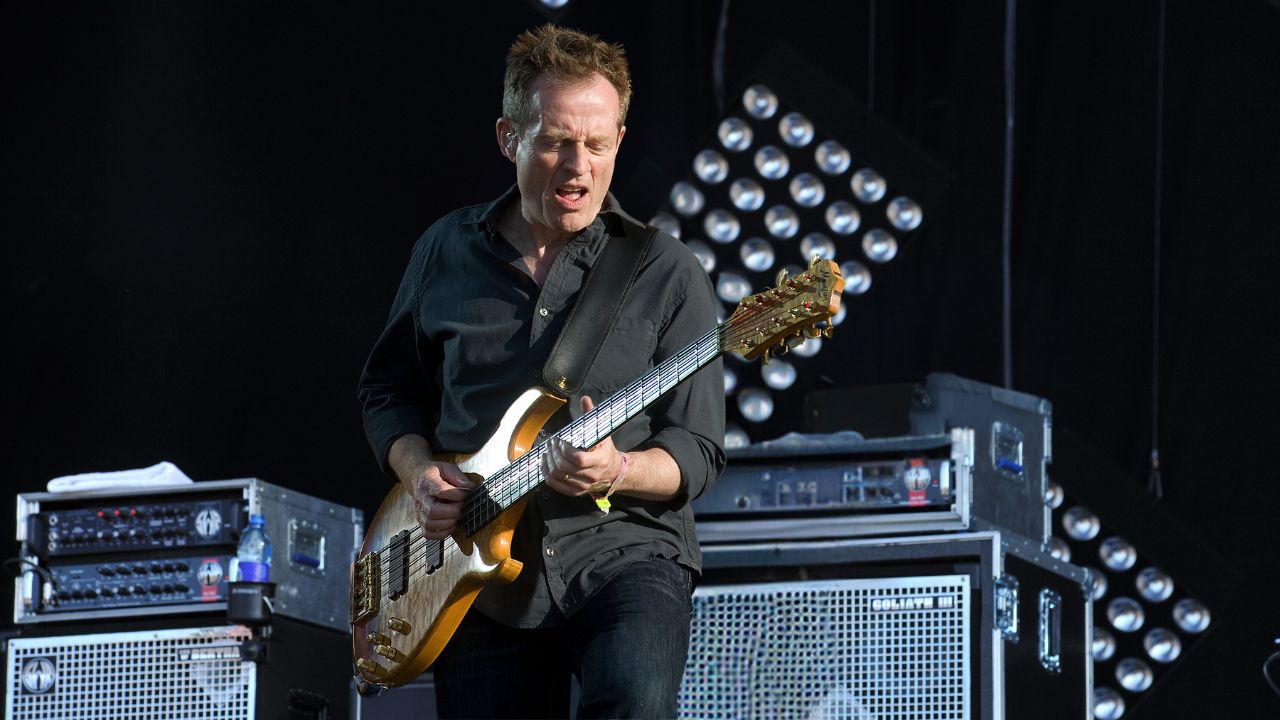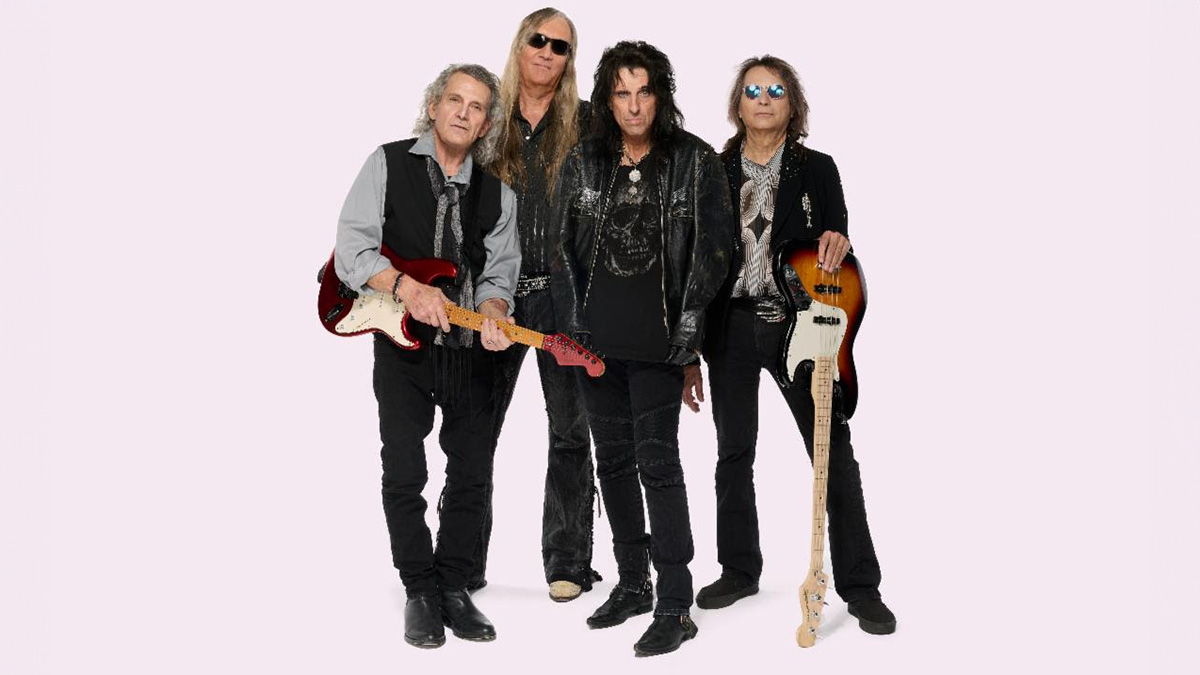“If you heard the first demo of that song you wouldn’t believe it!” How Led Zeppelin’s legendary multi-instrumentalist took flight with Them Crooked Vultures
Back in 2010, John Paul Jones, Dave Grohl and Josh Homme joined forces in a bid to redefine heavy rock

John Paul Jones has no need for further feathers in his cap. The bassist, keyboardist, and general rock ’n' roll badass anchored Led Zeppelin – arguably the most influential hard rock outfit in history – and has gone on to collaborate in too many cool projects to mention.
When he took the stage at London's O2 Arena in 2007 with Zeppelin bandmates Jimmy Page and Robert Plant (along with Jason Bonham, son of late, great Zep drummer John Bonham), Jones sealed his reputation as a top-notch performer with deep soul, crisp tone, and killer chops.
Jones could have easily rested on his laurels, retiring to the countryside with his countless acoustic instruments and giving his ears a well-deserved rest. Instead, he formed one of the most riveting new groups in contemporary rock, Them Crooked Vultures.
A collaboration between Jones, ex-Nirvana drummer and current Foo Fighters frontman Dave Grohl, and Queens of the Stone Age principal Josh Homme, Them Crooked Vultures took the '70s-era riff rock of Jones's youth and blended it with punk-rock energy courtesy of drummer Grohl. For his part, Homme tapped the sludgy depths of his stoner rock past.
“The first time we got together we just jammed in a normal muso sort of way,” Jones told Bass Player. “New Fang was one of those early workings.
“Another idea Josh came up with, Dave and I looked at each other and thought, ‘Are you serious? What are you thinking?!’ He played this riff that he’d recorded in a hotel room on an electric guitar that wasn't even plugged in, but Josh was telling us, ‘No, it's going to be good,’ so we tried it and that turned into the track Reptiles. If you heard the first demo of that song you wouldn't believe it.”
Bass Player spoke to John Paul Jones back in March 2010 about what it's like playing with Dave Grohl, why you have to use a pick to play multi-string basses, and why he has no plans to write an autobiography.
Get The Pick Newsletter
All the latest guitar news, interviews, lessons, reviews, deals and more, direct to your inbox!
How did you record with Them Crooked Vultures?
“We basically went into Josh's studio, sat in a room, and wrote and recorded at the same time. It was a very organic process where we'd groove in the studio, working on each other's ideas. There was a lot of laughing involved as well – it's amazing we got that much work done!”
Prior to these sessions, had you ever played with Dave Grohl?
“No, I hadn't. He's wonderful, and we get on really great together. He appreciates good grooves and good riffs. We listen to each other and we reinforce each other and we stretch each other, which is the best combination.”
Has your concept of tone changed much through the course of this project?
“I'm playing with a pick a lot more. You have to use a pick to play multi-string basses, or you don't get the full advantage of the double crosses.”
Do you find playing with a pick compromises your low-end?
“No, not really. It's just a different feel – a different attack. It's a much faster attack, and it gives you more of a rhythmic drive, especially on faster songs.”
What is that wild-looking guitar you play on No One Loves Me & Neither do I?
“That's an instrument Hugh Manson made that is based on the Melobar. It basically allows me to play lap steel while moving around onstage. I wanted one I could hang around my neck so I asked Hugh to make me one.”

Live, Alain Johannes is playing some of the bass, guitar and keyboard parts. How much did you work with him to get him up-to-speed?
“Not much at all – he's a good enough musician to have picked it up on his own.”
What basses are you playing?
“I've got my good ol' Manson 4-string, plus a 10-string and some 12-strings he's made for me. The 10-string is in octave courses, tuned EADGC, and the 12-string is BEADGC. Those go through an SWR SM-900 with 4x10 and 1x15 cabinets.
“I use an identical rig for my bass pedals, which are made by Roland. They span an octave-and-a-half-from C to G, and they're run through a Korg M3 synth, which provides the actual sound. I also play the M3 for piano and organ parts.”
With multiple basses, keyboards, slide guitar, and mandolin, you do a lot of changing instruments. Do you find that makes it difficult to get into a groove?
“No, I'm rather used to it. I used to do that in the Zeppelin days, as well. I quite like changing instruments.”
How much of the gig is set in stone, and how much is kept open-ended?
“The setlist mostly stays the same, but things really change a lot from show to show. A lot of it depends on the vibe of the night, but we'll often hit a different kind of groove to keep it interesting.”
The album has quite a few distorted bass sounds. What effects are you using?
“On the record, most of the distortion comes from running bass guitar through Josh's guitar amps. Live, I'm using an Electro-Harmonix Big Muff. I'd never really used distortion before – it's a new thing for me.
“The bass just sounded too clean when we were first trying things out. Now it fits a lot better with the guitars. Usually I'll split the signals from my basses and mix them together to get a blend of clean and distorted sounds.”

Is there anything you miss about your old Acoustic rig?
“No... except that it used to catch on fire! It actually caught fire quite spectacularly at the end of one show. I suppose the power amp got overheated. But no, I'm quite pleased with the SWR. It's got a nice clean, punchy sound.”
Have you given thought to writing a memoir or autobiography?
“No. Several people have asked, but I've just got too much to do. Life's too short to write about it.”

Nick Wells was the Editor of Bass Guitar magazine from 2009 to 2011, before making strides into the world of Artist Relations with Sheldon Dingwall and Dingwall Guitars. He's also the producer of bass-centric documentaries, Walking the Changes and Beneath the Bassline, as well as Production Manager and Artist Liaison for ScottsBassLessons. In his free time, you'll find him jumping around his bedroom to Kool & The Gang while hammering the life out of his P-Bass.
“I knew the spirit of the Alice Cooper group was back – what we were making was very much an album that could’ve been in the '70s”: Original Alice Cooper lineup reunites after more than 50 years – and announces brand-new album
“The rest of the world didn't know that the world's greatest guitarist was playing a weekend gig at this place in Chelmsford”: The Aristocrats' Bryan Beller recalls the moment he met Guthrie Govan and formed a new kind of supergroup




![[from left] George Harrison with his Gretsch Country Gentleman, Norman Harris of Norman's Rare Guitars holds a gold-top Les Paul, John Fogerty with his legendary 1969 Rickenbacker](https://cdn.mos.cms.futurecdn.net/TuH3nuhn9etqjdn5sy4ntW.jpg)





